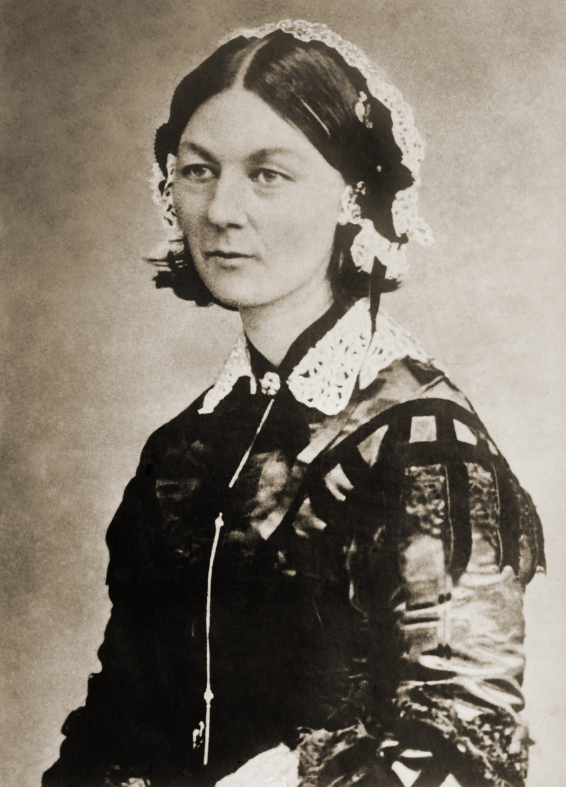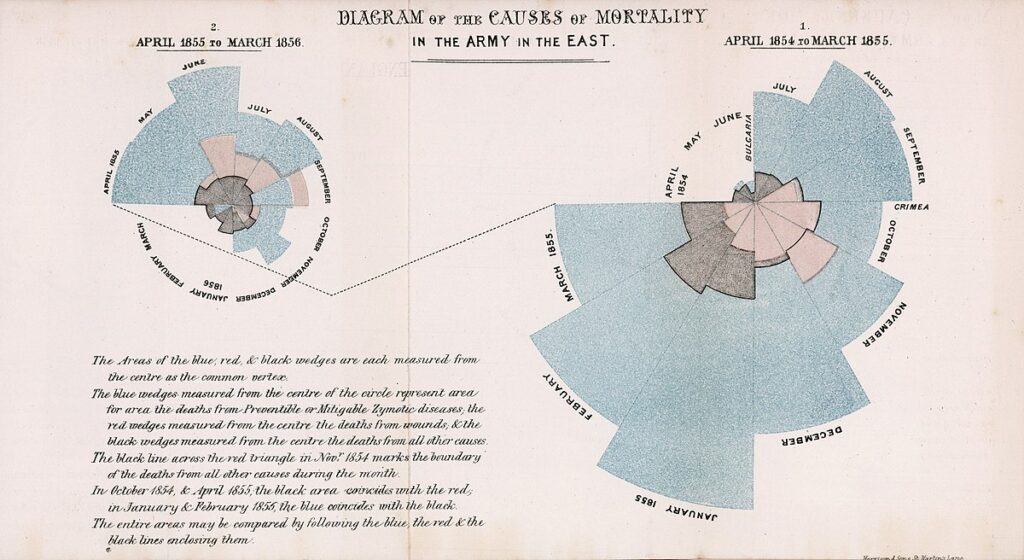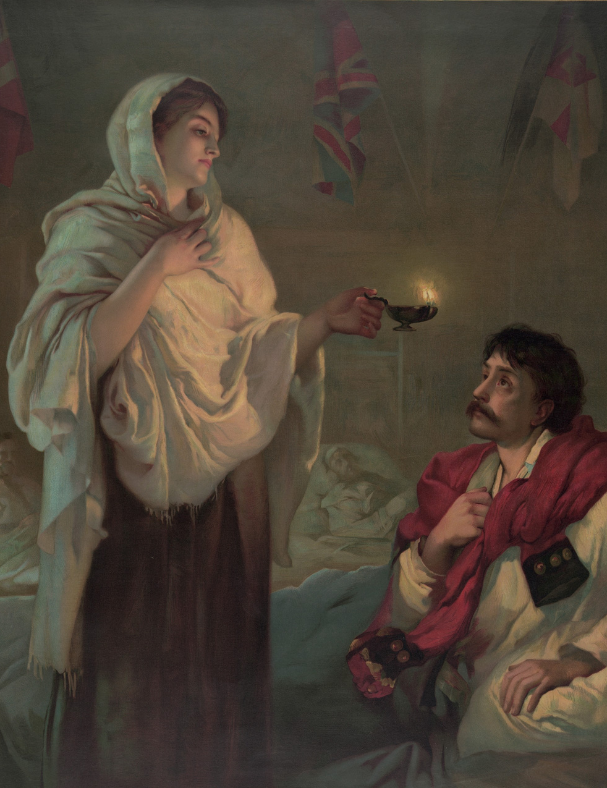Known as the pioneer of modern nursing, Florence Nightingale was much more than just a nurse. Though often overshadowed by her achievements in nursing, she was also a formidable social reformer and talented statistician. Indeed her impact in nursing may not have been quite so dramatic if not for her exceptional skills with statistics. Her impact in social reform may not have been so massive, if not for her first hand experience in nursing. Below, we will explore why she became a symbol of compassion and dedication, and such an iconic figure in the 19th century!

Life Summary
- Lifespan: May 12, 1820 – August 13, 1910
- Birthplace: Florence, Italy
- Moved to England: The Nightingale family returned to England in 1821, settling in Embley Park, Hampshire, and later at Lea Hurst, Derbyshire.
- Known for: Founding modern nursing, social reform, and statistical innovations
- Crowning Achievement: Florence Nightingale’s most notable achievement was her role in founding modern nursing and transforming it into a respected and vital profession. Her work during the Crimean War is particularly celebrated. Nursing on the front line, she significantly improved the sanitary conditions of the war hospitals, dramatically reducing the death rate. Her establishment of the Nightingale Training School for Nurses at St. Thomas’ Hospital in London in 1860 marked a pivotal moment nursing and professional health care.
Early Life and Influences
Born in the beautiful city of Florence, Italy, Florence Nightingale was named after her birthplace. Growing up in a wealthy British family, she was educated at home by her father. Despite societal expectations for women of her class, Florence felt a calling to nursing. Her family initially opposed this, but Florence’s determination won. She was influenced by her travels and experiences, which shaped her views on healthcare and social reform. Who would know at that time this path would lead her to become one of the most famous Victorians still researched today.
What Is Florence Nightingale Famous For
When people talk about Florence Nightingale, it is mostly for her role in transforming nursing into a respected profession. In pop culture and many film references, it is her service during the Crimean War that is most referenced. During the war, she led a team of 28 nurses, guiding them to improve the unsanitary conditions at a British base hospital. Her dedication to this task helped to drastically reduce the infection and death rates of wounded soldiers.
On her return from the war, she continued to strongly advocate for healthcare reforms. Her great skill as a statistician helped her put forward her case and to earn political support for her cause. She eventually established the Nightingale Training School for Nurses.
Florence as a Social Reformer
Florence Nightingale wasn’t just concerned with nursing but with all healthcare across broader society. She had a firm understanding of the link between social conditions and health issues, and became a powerhouse of social reform for this cause. Nightingale recognized that to improve general health, issues like poverty, poor living conditions, and inadequate nutrition had to be addressed. Here’s how Nightingale helped to make a difference through social reform:
- Advocacy for Sanitation – Florence understood that cleanliness was crucial in preventing disease. She initiated campaigns for improved sanitation not only in military and civilian hospitals, but also in residential areas. Her skill in this type of advocacy and diplomacy is something that is often overshadowed by her nursing.
- Education for All – She believed in educating the public about health and hygiene. Florence wrote simple instructional materials to teach people how to maintain personal and household cleanliness.
- Influencing Policies – Her efforts didn’t stop at the grassroots level. With her skill and influence, she helped to advocate for health policy reforms that impacted both national and international health care systems.
Florence as a Statistician

The role of Florence Nightingale as a statistician is often overshadowed by her nursing fame, but it was, in some ways, equally as ground breaking. Her aptitude with statistics even aided her case to bring about needed change in healthcare:
- Innovative Use of Statistics – Florence was one of the first to use statistics to influence health policy. She would skilfully collect data on mortality rates, and then use the information to demonstrate the undeniable need for health care reform. This might seem like ‘run of the mill’ research today, but back then it was a skill rarely used in healthcare.
- Pioneering Visuals – She developed the ‘coxcomb’ diagram, a form of pie chart, to present her statistical findings in a way that was both informative and compelling. This was a revolutionary approach to data visualization at the time. Another fine example of her exceptional skill beyond the ward.
- Educating the Government – Her statistical analyses were so powerful that they convinced the British government to improve military and civilian hospital conditions. They also arguably helped to inspire the movement of philanthropy that took grip at this time, to improve the social and living conditions, particularly for poor Victorian children.
Florence and Nursing
Florence Nightingale’s impact on nursing is immeasurable. She revolutionized the field in several key ways:
- Professionalizing Nursing – Before Florence, nursing was not seen as a respectable profession, and certainly not a profession for a respectable lady. Until this time it was a job performed mostly by men, and not considered to be a ‘profession’ in itself. Nightingale elevated the status of nursing, establishing it as a noble and vital profession. She was the first ‘professional nurse’ and essentially the founder of modern nursing. She also helped to challenge the social ‘norms’ around women in this role and in society.
- Emphasis on Training – She founded the Nightingale Training School for Nurses at St. Thomas’ Hospital in London, setting the standard for nursing education.
- Holistic Care Approach – Florence advocated for a holistic approach to patient care. Treatment was not enough without a clean environment, good nutrition and emotional support. Florence knew this and emphasized this in her nursing and in her advocacy for reform.
- Legacy in Nursing Education – Nightingale’s book, “Notes on Nursing: What It Is, and What It Is Not,” was first published in 1859, and is still in print to this day. It is a book as relevant today as it was back then. A book that lays down the principles of nursing care with compassion and professionalism at heart. Nursing is not a career you go into for the money or the power. It’s not for everyone and it takes strength, dignity and compassion. Nightingale is a symbol of all these things, that any nurse entering the profession aspires to reflect.
Why Do We Call Her The Lady with The Lamp?

Florence earned the nickname ‘The Lady with the Lamp’ during the Crimean War. She would often make rounds at night, holding a lamp, to check on the soldiers. This act of compassion made her a symbol of hope and care.
Impact on Victorian Society and Children
Florence Nightingale’s impact on Victorian society was profound. She challenged the gender norms of her time and inspired many women. She was symbolic of a fighting spirit, to not be told what you ‘must do’ in society, that women had a larger role and benifit to play in society. Her emphasis on sanitation and health education also significantly improved the lives of children, greatly reducing mortality rates and improving health everywhere, particularly the slums.
10 Fun Florence Nightingale Facts
- Florence was fluent in multiple languages.
- She had a pet owl named Athena.
- Florence never married, dedicating her life to nursing.
- She was the first woman to receive the Order of Merit.
- Nightingale’s birthday is celebrated as International Nurses Day.
- She wrote over 200 books, pamphlets, and reports on health-related issues.
- Florence often wrote under a pseudonym.
- She was a close friend of Queen Victoria.
- According to one article in the National Library of Medicine, Nightingale’s work in the Scutari hospital during the Crimean War. helped to reduce the death rate from 42% to 2%.
- She was offered a burial at Westminster Abbey, but her family declined, honouring her wishes.